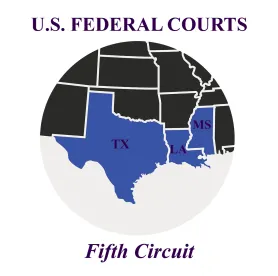In Belliveau v. Barco, Inc., a licensor of intellectual property sued the owner of the licensee for breach of fiduciary duty related to the sublicensing to a third party. No. 19-50717, 2021 U.S. App. LEXIS 2489 (5th Cir. January 28, 2021). The district court dismissed the claim, and the plaintiff appealed. The court of appeals affirmed, holding that the defendant did not owe a fiduciary duty to the plaintiff.
The court of appeals described that there can be two types of fiduciary relationships, a formal and an informal relationship. The plaintiff alleged both in this case. He alleged that the defendant had an attorney/client relationship with him because its in-house counsel represented him in the sublicense transaction. Regarding this issue, the court stated:
First, Belliveau asserts there was an implied attorney-client relationship between himself and Barco’s in-house lawyers. “An agreement to form an attorney-client relationship may be implied from the conduct of the parties.” “But whether the agreement is express or implied, there must be evidence both parties intended to create an attorney-client relationship—one party’s subjective belief is insufficient to raise a question of fact to defeat summary judgment.” In other words, courts “determine whether a[n] [attorney-client] contract can be implied using an objective standard . . . and . . . do not consider [the parties’] unstated, subjective beliefs.” Belliveau alleges that two of Barco’s in-house lawyers, Kurt Verheggen and Carolyn Vignery, represented him in sublicensing his intellectual property.
Id. The court disagreed, however, that the evidence supported such a relationship. The court noted that the plaintiff’s affidavit merely reflected his subjective beliefs and otherwise was vague and conclusory. For example, the court noted: “Rather, the paragraph that Belliveau cites states that ‘Barco employees, including its in-house lawyers, agreed to act at my direction on matters related to my IP.’ As the district court held, Belliveau fails to explain what in-house lawyers acted at his discretion, or whether they did so with the intention of representing him in a legal capacity.” Id. The court affirmed that there was no formal fiduciary relationship.
The court then turned to the plaintiff’s informal, confidential relationship argument and held:
Belliveau argues, in the alternative, that there was an informal confidential relationship between himself and Barco. “Texas law does not recognize a fiduciary relationship lightly, especially in the commercial context.” “It is well settled that ‘not every relationship involving a high degree of trust and confidence rises to the stature of a fiduciary relationship.'” Instead, “[t]o impose an informal fiduciary duty in a business transaction, the special relationship of trust and confidence must exist prior to, and apart from, the agreement made the basis of the suit.”
To show an informal fiduciary relationship, Belliveau alleges, again based on his declaration, that Barco ensured, for almost a decade, that High End met its contractual duty to commercialize Belliveau’s IP on reasonable terms, and that Barco involved Belliveau in all sublicensing efforts. But, as the district court found, the 2008 High End License is the basis of Belliveau’s suit, and he offers no evidence of a relationship predating that agreement. Indeed, the record suggests that Barco did not enter the picture until 2008, when it purchased all High End’s shares. Belliveau has not demonstrated the existence of an informal confidential relationship with Barco.
Still, Belliveau contends that the 2017 Barco Sublicense, not the High End License, is the agreement that should be used to measure the existence of a prior relationship. As noted, however, the test is whether the “special relationship of trust and confidence” existed prior to the “agreement made the basis of the suit.” But the agreement that forms the basis of Belliveau’s lawsuit is the High End License. After all, Belliveau sued Barco for breach of that agreement. Further, even if the court used the Barco Sublicense as the start of the relationship look-back period, Belliveau provides no evidence that his preexisting relationship with Barco consisted of anything more than arms-length transactions commencing with the High End License. The Texas Supreme Court has expressly rejected the use of such interactions to establish a relationship predating the challenged agreement.
Belliveau reasons that the preexisting relationship rule does not necessarily apply here. Citing Jacked Up, L.L.C. v. Sara Lee Corp., 854 F.3d 797 (5th Cir. 2017), and Schlumberger Tech. Corp. v. Swanson, 959 S.W.2d 171 (Tex. 1997), he insists that courts only look to a preexisting relationship when “the plaintiff transacts with the defendant and then claims that the defendant betrayed his trust in that transaction.” Belliveau correctly distinguishes Jacked Up and Schlumberger on the facts; both cases involved disputes between litigants over transactions to which they were both parties. By contrast, Belliveau and Barco had no contractual relationship. But this is a commercial case in which Belliveau is attempting to impose a fiduciary duty on Barco based on the parties’ business relations. Belliveau’s foundational theory of liability is that Barco should be held responsible for High End’s contractual obligations. Belliveau can hardly argue that he does not need to show a prior relationship because the parties have no formal contractual relationship.
Id. The court affirmed the dismissal.




 />i
/>i

